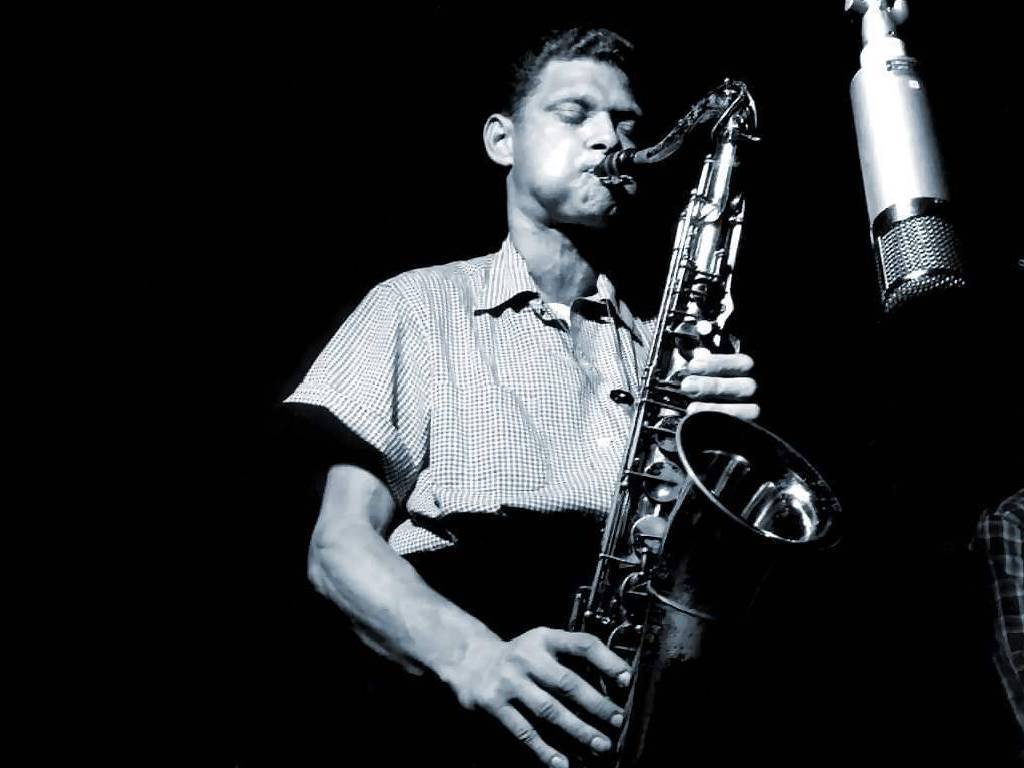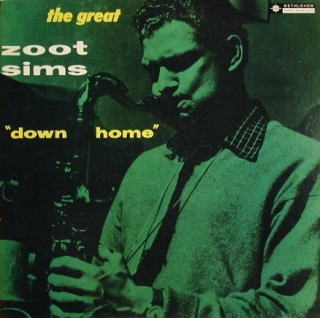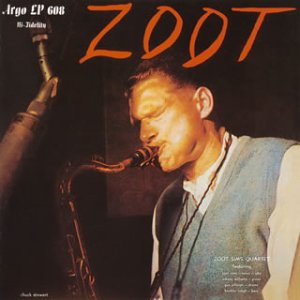|
 ZOOT
SIMSiTENOR SAXOPHONE) ZOOT
SIMSiTENOR SAXOPHONE)
Zoot Sims was born in Englewood, California from 1925 to
1985.
He
became a saxophonist longing for Leicester Young and was called the
strongest saxophonist by the swing style.
There is a person who says the feature of his play in one
word, "unsophisticated". In other words, "In a manner of speaking like a
rural farmer in the country, he plays and organizes it into a phrase in a
rhetorical fashion, so that he can hasten one word per word.He plays quite
a high speed performance, but listeners do not feel fiery. He liked the
sound of a high tone, hence, later, in addition to tenor saxophone,
soprano saxophone also began to blow. But as a general image, his
saxophone sound is thought to have a heavy line and thick weight like a
massive back. Therefore, he is called to "warm".@That is opposite "cool".
He
played a style in cooperation with the ensemble due to the influence of
the experience he played in the big band at a young age. His performance
was to make the concept realize as a whole while making full use of
co-stars and accompanists. He often repeats similar clauses in the same
way. I think he is not an improvisational genius. He cannot always create
amazingly wonderful phrases in ad lib. So, he plays like stacking so rich
phrases over and over again. By repeating the phrase, he creates a rhythm
and creates his unique propulsive swing. By repeating the same phrase he
listens to his phrase. When familiar phrases ride on his unique straight
and swinging grooves, the listener has a sense of close affinity that will
be invited to his groove. I think that is his characteristic. That is his
"unsophisticated ".
Repetition is continuation. Stability requires stability. The
big appeal of jazz is the improvised thrill of A Drive, or the unreadable
fun of the development which does not know what will come out in the
future. The charm of such jazz is incompatible with stability. Therefore,
those who think that the thrill of improvisation is the appeal of jazz
will feel monotonous, the stability feeling born by repeated phrases. But
I think that it is the source of his warm taste.
|
Down
Home@@@PXUONUVϊ^Ή
 Jive at Five Jive at Five
Doggin' Around
Avalon
I
Cried for You
Bill Bailey
Goodnight, Sweetheart
There'll Be Some Changes Made
I've Heard That Blues Before
Zoot
Sims(ts)
Dave
Mckenna(p),
George Tucker
(b),
Dannie
Richmond(ds) @
Zoot Sims is not a type of musician who creates
something innovative by pulling members solely as a leader. Rather,
he constantly relaxed the listener with a stable playing. With "Down
Home" you recorded on the Bethlehem Label, you will be able to know
about his characteristics.
Some say that his performance is monotonous. I think
the whole of their performance in this album is unknown overflowing
with a nostalgic swing feeling. The big factor creating this swing
is Danny Richmond's heavy drumming and Dave McKenna's swing-like
piano. This rhythm section is fueling Zoot. In contrast, Zoot
integrates with the band like a big-band soloist, playing Swingy
phrases in ad lib, considering the balance with the back, which is
responsible for that solo part. After all, since he was 15 years
old, he has worked as a professional in the Swing Jazz Big band. He
creates and plays a phrase so as to assemble a voiceless sound one
by one. You will not think of his performance as a melody that the
phrase flows to the sideways, and will treat it as a step of the
vertical rhythm. And you will get angular impression. In addition,
you will unconsciously transfer your attention to the rhythm of the
bass and drum, and you will hear strongly the nostalgic swing
rhythm. You hear that rhythm will again fuel Zoot. Here, you get
stuck in the circulation. Among them, you will find that Zoot's
performance is naive and idyllic, but keeping the tension without
relaxation. @ |
|
Zoot@@@PXTUNPOPQϊ^Ή
 9:20
Special 9:20
Special
The
Man I Love
55th Street
The
Blue Room
Gus's Blues
That Old Feeling
Bohemia After Dark
Woody'N You s
Gus
Johnson(ds)
Johnny Williams(p)
Knobby Totah (b)
Zoot Sims(ts) @
Zoot Sims left a lot of recordings. I admire that he
plays steady play each time with less waves of discomfort through
those recordings. To tell the truth, I think it is a terrible thing.
Because even though jazz is a music characterized by a single
improvised performance, jazz musicians do not always come up with a
good phrase every time. Moreover, if the performer records the
performance, the recorded performance will remain in posterity. If
people had the last recording, of course, what is this recording
compared to last time? They expect more than that if the last
recording is wonderful, this time of course. They will say that this
recording is disappointing if it is on the same level as last time.
So, the musicians have to play more than the last time, they will be
overwhelmed with excessive pressure and will be recording. So, he
constantly keeps stable results every time. I think it can be said
that it is actually a gift of extraordinary talent or hidden
effort.
But I think that he always had the dangers of
obsolescence against such stability. Even if I try to recommend a
masterpiece to the person who is going to listen to his album from
now on, I will be bothered to choose. Because his albums are similar
in the end, so they do not change so I get lost in picking up one of
them. Such a thing is impossible except when choosing Zoot's
album.
So, if you want to distinguish between the differences
in his albums or to make the likes and dislikes for them clear, it
will decide the membership and organizational changes other than
him.
This recording was his first leader album. In the
formation of one horn by his tenor, it is the same form as "Down
Home". Participating members are different from "Down Home". I felt
a more sophisticated impression with the sharp feeling of the
playing by this member. Especially for piano's comfortable sound,
someone will feel it noisy with metallic feeling.
The remarkable appearance of his character is the
second number, "The Man I Love", the slow number. His play here
seems to refuse to listen emotion. There is also no dust in the
place where it is used. Some people say such a performance is
masculine. He keeps the form of melody and music strict enough to
say it. He is particularly concerned about maintaining the sense of
rhythm, the entire groove. Even though he is a slow number like this
song, I value the advancement of the performance forward by
maintaining a stable rhythm rather than singing plenty of melodies.
If you listen to this performance, you will never partly play in the
performance, you will experience a pleasant swing feeling born from
a stable rhythm while keeping a certain distance from the
performance. You will never leave the music at all, keep keeping the
exquisite sense of distance that you cannot say that you will not
leave music. So, you think you can listen to it all the time without
stopping the recording endlessly.
That applies to his ad lib. You rarely find out about
his improvisation, especially the wonderful phrases and surprising
developments, the sharpness of the sharpness of improvisation
itself. You are caught up in the rhythm that is created by repeating
similar phrases as his improvisation continues. So, you may listen
to his phrase like a theme variant. So, if you pay attention to the
phrase partially, you will be unable to get on the rhythm. That's
why his saxophone does not stand out partly like blowing. He always
keeps stability and is blowing lightly with a margin with 80% power.
Its true bone appears in good tempo numbers such as "9: 20 Special",
"55th Street", "Bohemia After
Dark". |
| Jutta Hipp With Zoot
Sims PXTUNVQWϊ^Ή
 Just Blues Just Blues
Violets for Your Furs
Down Home
Almost Like Being in Love
Wee
Dot
Too
Close for Comfort
Jutta Hipp (p)
Zoot Sims (ts)
Jerry Lloyd (tp)
Ahmed Abdul-Malik (b)
Ed
Thigpen (ds)
It is under the name of a German female pianist, Utah
Hip, but the listeners are Zoot's tenor saxophone, and Zoot is the
leading role of album.
Zoot Sims is not an innovative type, but a robust
player who adheres to his style stubbornly. As a tenor saxophonist,
he was influenced by Leicester Young. His best feature lies in
making the listener fun, or getting through.
"Just Blues" at the beginning is an impressive
performance feeling of the performance produced by the propulsive
force which is mellow but powerfully
forward.
In particular, the second song "Violets for Your Furs"
is a famous performance. I have the following comments about this
performance. "Even by listening to this one song, you can easily see
the skill of the tenor saxophonist, Zoot Sims, for example, let's
look at John Coltrane, also a tenor player who is playing the same
song. Is playing the "Sumire in the court" at the premier leader
work "Coltrane" at Prestige, this performance is also regarded as a
masterpiece and continues to be loved by many jazz fans.There is
also support for Red Garland's piano Although it is the same tenor
player, Zoot and Coltrane 's speech is quite different.If you listen
to this difference, the qualities of both are emphasized and
interesting.The Coltrane' s " "A violet on a coat" is as if a simple
country youth is speaking a woman for the first time in her life
Tadadado is freshly felt and this clumsy ballad expression will
rather hit many listeners, but what about Zuto ... What is already
"Zuto's mouth" in this performance An eloquent speech that kept the
points pressed, as if the eldest man who had hinted a hundred women,
as lightly as everyday extended lines, without any seriousness. The
difference in this speech may be due to the qualities that were
born, and there may be differences in experience values. Zoot's
storyteller is extremely smart and smart, even though there are
defects mixed in trace amounts.
" |
|
 ZOOT
SIMSiTENOR SAXOPHONE)
ZOOT
SIMSiTENOR SAXOPHONE)

